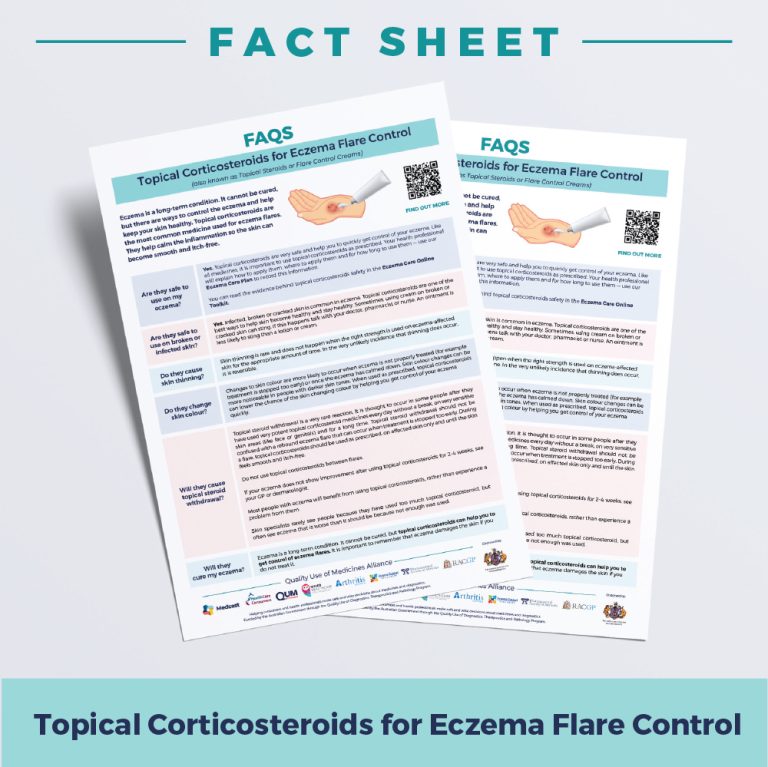Thank you for downloading!
Subscribe to our newsletter to receive email updates about our work, get connected and support Australians impacted by eczema. You can unsubscribe at any time.
Subscribe NowEczema is a long-term condition. It cannot be cured, but there are ways to control the eczema and help keep your skin healthy. Topical corticosteroids (steroid creams) are the most common medicine used for eczema flares. They help calm the inflammation so the skin can become smooth and itch-free.
Topical corticosteroids are also known as ‘steroid creams’ or ‘flare control creams’.
This factsheet has been carefully co-designed with input from people with eczema, parents & carers, dermatologists, and other health professionals. This collaborative approach ensures that the information is both medically accurate and practically relevant for everyday care.
In this download you will find answers to frequently asked questions about the safety of topical corticosteroids or steroid cream for eczema.

In this expert interview, dermatologist Dr Troy Darben provides unfiltered insights into the use of topical corticosteroids, commonly known as flare control creams or steroid creams, in eczema management.
Dr Darben addresses common questions and concerns about these treatments, explaining their benefits, potential side effects, and proper usage. He also debunks myths surrounding steroid creams, offering clear, evidence-based advice to help patients and caregivers make informed decisions.
This video is essential viewing for anyone seeking to understand more about the role of topical corticosteroids in eczema care.
Topical Steroid Withdrawal (TSW): What You Need to Know
In recent times, some people in the eczema community have become concerned about topical steroid withdrawal (TSW), a condition that a small number of people report experiencing after using topical corticosteroids.
At Eczema Support Australia, we understand that it can be worrying it can be to hear about potential side effects. However, it’s important to know that topical corticosteroids (also known as flare control creams or steroid creams) are safe and effective when used as prescribed.
Topical steroids have been a cornerstone of the eczema treatment for over 50 years. Millions of people around the world, including many in our community, have used these creams to manage flare-ups and gain relief. For many, they are essential in keeping eczema under control when used alongside moisturisers and by avoiding triggers.
While there have been reports of individuals who believe they have experienced TSW, the Australasian College of Dermatologists (ACD) and the Royal Australian College of General Practitioners (RACGP) emphasize that TSW is a very rare reaction. A far more common scenario is that the skin worsens after stopping steroid treatment due to the resurgence of eczema.
Dr Adriene Lee, President of the ACD, explains, “Topical steroid withdrawal is a very rare reaction. What we often see when eczema worsens after stopping topical steroids is that the condition was undertreated, or the underlying eczema is resurfacing. Anyone concerned about using topical steroids should discuss this with their GP or dermatologist.”
At Eczema Support Australia, our goal is to provide clear, evidence-based information to help guide our community. While it’s important to be aware of potential side effects, we want to ensure that fear of rare reactions like topical steroid withdrawal (TSW doesn’t stop people from using an effective and proven treatment. Managing eczema can be tough, and it’s important that we don’t lose access to tools that help us keep the condition under control.
Kim Johnson, a member of our community who has lived with eczema for over 50 years, shares her experience: “Topical steroids have enabled me to live a normal life. Without steroid creams, my eczema wouldn’t be under control.”
There’s also the concern that avoiding steroid creams out of fear could cause more harm than good. Dr Lee notes, “Unfortunately, dermatologists see far more suffering caused by the avoidance of topical steroids, which can lead to the development of more severe disease.”
This is echoed by Dr Anneliese Willems from the RACGP, who says, “Eczema is a complex and chronic condition that requires a high level of self-management. It’s essential that patients have time to discuss their concerns about steroids during consultations so that GPs and dermatologists can provide guidance and evidence-based advice.”
If you or your loved ones are using topical steroids or are concerned about topical steroid withdrawal, here are a few key points to keep in mind:
Eczema is a lifelong condition and it’s important to find, and the most important thing is finding a management plan that works for you. If you have concerns about using topical steroids, don’t hesitate to reach out to your healthcare provider to ensure you have an Eczema Care Plan tailored to your needs.
Use our Eczema Care Online Toolkit to find out the best way to care for your eczema or your child's eczema.
Subscribe to our newsletter to receive email updates about our work, get connected and support Australians impacted by eczema. You can unsubscribe at any time.
Subscribe Now